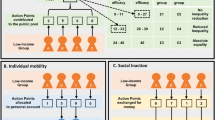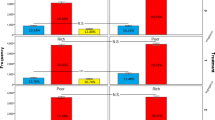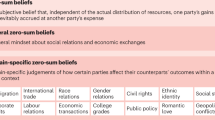Abstract
Income inequality is pervasive despite evidence of inequality-averse social preferences. We show that people will sometimes support inequality to avoid reversing the rank of others in society. Using a third-party dictator game that we call the redistribution game, we found that people sometimes choose more unequal outcomes to preserve existing hierarchies. When a proposed transfer reversed pre-existing income rankings, adults across cultures were twice as likely to reject the transfer. Running the same experimental game in a society of nomadic Tibetan herders with a low level of market integration1, we observed an exceptionally high aversion to rank reversals. In children, we found that inequality aversion develops between the ages of four and five, as shown in previous studies2,3, whereas rank reversal aversion develops between the ages of six and seven. Just as some animal species develop stable pecking orders to reduce in-group violence, human aversion to reversing rank is observed at an early age and across cultures.
This is a preview of subscription content, access via your institution
Access options
Access Nature and 54 other Nature Portfolio journals
Get Nature+, our best-value online-access subscription
$29.99 / 30 days
cancel any time
Subscribe to this journal
Receive 12 digital issues and online access to articles
$119.00 per year
only $9.92 per issue
Buy this article
- Purchase on Springer Link
- Instant access to full article PDF
Prices may be subject to local taxes which are calculated during checkout



Similar content being viewed by others
References
Ensminger, J. in Foundations of Human Sociality: Economic Experiments and Ethnographic Evidence from Fifteen Small-Scale Societies (eds Henrich, J. et al.) 356–381 (Oxford Univ. Press, 2004).
Fehr, E., Bernhard, H. & Rockenbach, B. Egalitarianism in young children. Nature 454, 1079–1083 (2008).
Sutter, M. & Kocher, M. G. Trust and trustworthiness across different age groups. Games Econ. Behav. 59, 364–382 (2007).
Archibald, K. The concept of social hierarchy in the writings of St. Thomas Aquinas. Historian 12, 28–54 (1949).
Magee, J. C. & Galinsky, A. D. Social hierarchy: the self-reinforcing nature of power and status. Acad. Manag. Ann. 2, 351–398 (2008).
Lewis, H. S. Leaders and Followers: Some Anthropological Perspectives (Addison-Wesley, 1974).
Fernandez, R. & Rodrik, D. Resistance to reform: status quo bias in the presence of individual-specific uncertainty. Am. Econ. Rev. 81, 1146–1155 (1991).
Zitek, E. M. & Tiedens, L. Z. The fluency of social hierarchy: the ease with which hierarchical relationships are seen, remembered, learned, and liked. J. Pers. Soc. Psychol. 102, 98–115 (2012).
Wilson, E. O. Sociobiology: The New Synthesis (Belknap Press, 2000).
Smith, J. M. Evolution Now: A Century After Darwin (W. H. Freeman, 1983).
Bowles, S. & Hwang, S. H. Social preferences and public economics: mechanism design when social preferences depend on incentives. J. Public. Econ. 92, 1811–1820 (2008).
Charness, G. & Rabin, M. Understanding social preferences with simple tests. Q. J. Econ. 117, 817–869 (2002).
Fehr, E. & Schmidt, K. M. A theory of fairness, competition, and cooperation. Q. J. Econ. 114, 817–868 (1999).
Kahneman, D. & Tversky, A. Prospect theory: an analysis of decision under risk. Econometrica 47, 263–291 (1979).
Frank, R. H. Choosing the Right Pond: Human Behavior and the Quest for Status (Oxford Univ. Press, 1993).
Kuziemko, I., Buell, R. W., Reich, T. & Norton, M. I. “Last-place aversion”: evidence and redistributive implications. Q. J. Econ. 129, 105–149 (2014).
Engelmann, D. & Strobel, M. Inequality aversion, efficiency, and maximin preferences in simple distribution experiments. Am. Econ. Rev. 94, 857–869 (2004).
Kahneman, D., Knetsch, J. L. & Thaler, R. H. Fairness and the assumptions of economics. J. Bus. 59, S285–S300 (1986).
Gächter, S. & Riedl, A. Moral property rights in bargaining with infeasible claims. Manag. Sci. 51, 249–263 (2005).
Blake, P. R., Ganea, P. A. & Harris, P. L. Possession is not always the law: with age, preschoolers increasingly use verbal information to identify who owns what. J. Exp. Child. Psychol. 113, 259–272 (2012).
Best, J. R., Miller, P. H. & Jones, L. L. Executive functions after age 5: changes and correlates. Dev. Rev. 29, 180–200 (2009).
Ruble, D. N., Feldman, N. S. & Boggiano, A. K. Social comparison between young children in achievement situations. Dev. Psychol. 12, 192–197 (1976).
Lerner, M. J. The justice motive: some hypotheses as to its origins and forms. J. Personal. 45, 1–32 (1977).
Furnham, A. Belief in a just world: research progress over the past decade. Pers. Individ. Dif. 34, 795–817 (2003).
Raihani, N. J., Grutter, A. S. & Bshary, R. Punishers benefit from third-party punishment in fish. Science 327, 171 (2010).
Fehr, E. & Fischbacher, U. Social norms and human cooperation. Trends Cogn. Sci. 8, 185–190 (2004).
Kahneman, D., Knetsch, J. L. & Thaler, R. H. Anomalies: the endowment effect, loss aversion, and status quo bias. J. Econ. Perspect. 5, 193–206 (1991).
Frank, R. H. Positional externalities cause large and preventable welfare losses. Am. Econ. Rev. 95, 137–141 (2005).
Friesen, J. P., Kay, A. C., Eibach, R. P. & Galinsky, A. D. Seeking structure in social organization: compensatory control and the psychological advantages of hierarchy. J. Pers. Soc. Psychol. 106, 590–609 (2014).
Halevy, N., Chou, E. Y., Galinsky, A. D. & Murnighan, J. K. When hierarchy wins: evidence from the National Basketball Association. Soc. Psychol. Personal. Sci. 3, 398–406 (2012).
Ronay, R., Greenaway, K., Anicich, E. M. & Galinsky, A. D. The path to glory is paved with hierarchy: when hierarchical differentiation increases group effectiveness. Psychol. Sci. 23, 669–677 (2012).
Lowery, B. S., Chow, R. M., Knowles, E. D. & Unzueta, M. M. Paying for positive group esteem: how inequity frames affect whites’ responses to redistributive policies. J. Pers. Soc. Psychol. 102, 323–336 (2012).
Hochschild, A. R. Strangers in Their Own Land: Anger and Mourning on the American Right (The New Press, 2016).
Acknowledgements
This research was supported by a grant from the National Natural Science Foundation of China (13&ZD073, 91124004, 71672169 and 31322023). The funders had no role in study design, data collection and analysis, decision to publish or preparation of the manuscript.
Author information
Authors and Affiliations
Contributions
W.X. and X.Z. designed the experiments. W.X. collected the data. W.X., B.H. and S.M. analysed the data. All authors wrote the manuscript and approved the final version.
Corresponding author
Ethics declarations
Competing interests
The authors declare no competing interests.
Supplementary information
Supplementary Information
Supplementary Methods, Supplementary Tables 1–4, Supplementary Figures 1–3
Rights and permissions
About this article
Cite this article
Xie, W., Ho, B., Meier, S. et al. Rank reversal aversion inhibits redistribution across societies. Nat Hum Behav 1, 0142 (2017). https://doi.org/10.1038/s41562-017-0142
Received:
Accepted:
Published:
DOI: https://doi.org/10.1038/s41562-017-0142
This article is cited by
-
Socially interdependent risk taking
Theory and Decision (2023)
-
Why are higher-class individuals less supportive of redistribution? The mediating role of attributions for rich-poor gap
Current Psychology (2023)
-
Rank Reversal Aversion and Fairness in Hierarchies
Adaptive Human Behavior and Physiology (2022)
-
The characteristics of average abundance function with mutation of multi-player threshold public goods evolutionary game model under redistribution mechanism
BMC Ecology and Evolution (2021)
-
Last word not yet spoken: a reinvestigation of last place aversion with aversion to rank reversals
Experimental Economics (2021)



